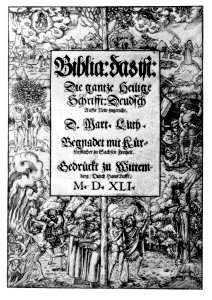| A
German version of the Bible prepared by Martin Luther and several
associates in Wittenberg. |
 |
|
Title
page of Luther's German Bible, 1541
|
Although acquainted
with earlier German versions of the Bible, Luther
prepared his fresh German version of the New Testament on the basis
of the Greek text of Erasmus. Luther's
translation appeared in 1522. This was followed in 1534 by a German
rendition of the Old Testament on the basis of the Hebrew text, prepared
by Luther and several associates in Wittenberg, including Philip
Melanchthon and Johannes
Bugenhagen. Translated into a fresh and homely high German, this
Bible helped shape both Lutheran piety and the German language for centuries
to come. The translation itself was governed not only by prevailing
knowledge of the ancient languages but by evangelical theology. Luther
did not, for example, restrain himself from adding a controversial "alone"
in his translation of Romans 3:28: "For we hold that a man is justified
by faith alone apart from the works of the law." While Luther
was aware that this was not a literal translation, he thought the message
of the passage required the interpolation. Luther's prefaces to the
Old and New Testaments as well as his introductions to the books of
the Bible provided basic theological and devotional reading for Lutherans
as long as his Bible remained in common use.
|
